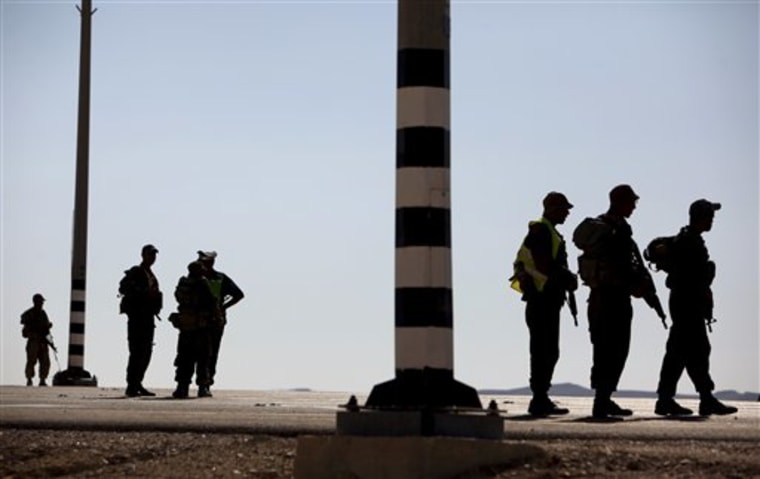Egypt said early Saturday it will withdraw its ambassador from Israel to protest the deaths of five Egyptian security forces in what it called a breach of a peace treaty, sharply escalating tensions between the two countries after a cross-border ambush that killed eight Israelis.
The Egyptian troops were killed as Israeli soldiers pursued suspected militants from the Gaza Strip who crossed the border from the Sinai Peninsula into southern Israel, killing eight Israelis on Thursday. It was the deadliest attack on Israelis in three years.
There were conflicting statements about how the Egyptians were killed, but an Egyptian Cabinet statement said it held Israel "politically and legally responsible for this incident," which it deemed a breach of the 1979 peace treaty between the two countries. It demanded an immediate investigation.
In strong language, it said Israel was to blame because lax security from its side allowed the ambush to take place.
"The Egyptian ambassador to Israel will be withdrawn until we are notified about the results of an investigation by the Israeli authorities, and receive an apology from its leadership over the sad and hasty remarks about Egypt," the Cabinet statement said.
It was the first time in nearly 11 years that Egypt decided to withdraw its ambassador from Israel. The last time was in November 2000 when the Egyptians protested what they called excessive use of violence during the second Palestinian uprising.
The decision to withdraw Egyptian Ambassador Yasser Reda came as hundreds of protesters staged demonstrations in front of the Israeli embassy in Cairo, unfurling a Palestinian flag, throwing fire crackers toward the top floor and calling for expulsion of the Israeli ambassador in response to the killings.
The decision came after Egypt's official news agency blamed the Israelis for shooting and killing.
The Cabinet statement did not repeat that claim but accused Israel of trying to "shirk responsibility for the recklessness of Israeli security forces in protecting the borders."
Israeli officials did not immediately comment on Egypt's decision, although the military promised on Friday to investigate the shootings.
An Israeli military officer, speaking on condition of anonymity in line with military regulations, initially said a suicide bomber, not Israeli soldiers, killed the Egyptian security forces. He said the attacker had fled back across the border into Egypt and detonated his explosives among the Egyptian troops.
Israeli media also reported that some of the sniper fire directed at the Israeli motorists Thursday came from near Egyptian army posts and speculated that the Egyptian troops were killed in the cross fire.
It was not possible to reconcile the different versions.
Retaliatory violence between Israel and the Islamic militant group Hamas also escalated Friday in the aftermath of Thursday's attack. Israeli airstrikes killed at least 12 Palestinians, most of them militants, in the Gaza Strip, and six Israelis were wounded when Palestinians fired rockets into southern Israel.
Truce off
In anger at Israel's punishing raids in which at least 15 have been killed since Thursday, Hamas gunmen in Gaza said they were calling off a de-facto truce in force with Israel since 2009, paving the way for a further violent escalation.
Israel had swiftly pinned the blame for Thursday's attack on a Palestinian group independent of Islamist Hamas and killed the faction's leadership in an air strike Thursday, while launching more than a dozen more raids Friday.
Among those killed in Israel's strikes were 11 militants and four civilians, including a physician and children aged 2, 5 and 13, said Hamas medical sources. Gaza militants responded by firing at least 24 rockets at Israel, spreading panic, and injuring two in the city of Ashdod.
"We have a policy of exacting a very heavy price of anyone who attacks us and this policy is being implemented," Israeli Prime Minister Benjamin Netanyahu said Friday while visiting wounded compatriots in hospital.
Hamas, whose militants have not claimed responsibility for any of the rocket fire, at first countered with warnings they would "not allow the enemy to escalate its aggression without getting punished."
A Hamas radio station announced the group's armed wing had decided "there is no longer any truce with the enemy," alluding to a 2009 deal that ended a three week Israeli offensive targeting militants firing rockets at the Jewish state.
In an apparent attempt to ease tensions later, a Hamas spokesman later told Reuters the radio statement "is not the official position." Gaza's Hamas leader Ismail Haniyeh said separately he was seeking Egyptian and United Nations intervention "to stop the aggression on Gaza."
The radio tirade followed Israel's latest air strike launched just before midnight, targeting a militant riding a motorcycle in Gaza City. The missile also slammed into a passing car, killing three civilians including a medical doctor and a child, Hamas medical officials said.
Israeli forces were swift to blame the Popular Resistance Committees (PRC) armed faction for Thursday's attack near the Red Sea resort of Eilat which killed when eight Israelis.
The group denied involvement in Thursday's ambushes, but did claim responsibility for some of Friday's rocket fire.
In New York, the U.N. Security Council met to consider a U.S.-drafted statement condemning the attack on the Israelis, but Lebanon, the sole Arab member, prevented agreement after insisting that the 15-nation body also condemn the Israeli strikes in Gaza, U.N. diplomats said.
U.S. envoy Rosemary DiCarlo described the failure of the council to speak on the issue "regrettable."
The sparsely populated Sinai forms a huge desert buffer zone between Egypt and Israel, who sealed an historic peace treaty in 1979 after fighting two wars in less than a decade.
Israel enjoyed good relations with U.S.-backed former Egyptian President Hosni Mubarak, but following his downfall in February, Israeli officials have regularly voiced concern about a security vacuum along their joint border.
In Washington, U.S. Secretary of State Hillary Clinton condemned the "brutal and cowardly attacks" on the Israelis near Eilat. She said the violence "only underscores our strong concerns about the security situation in the Sinai Peninsula."
